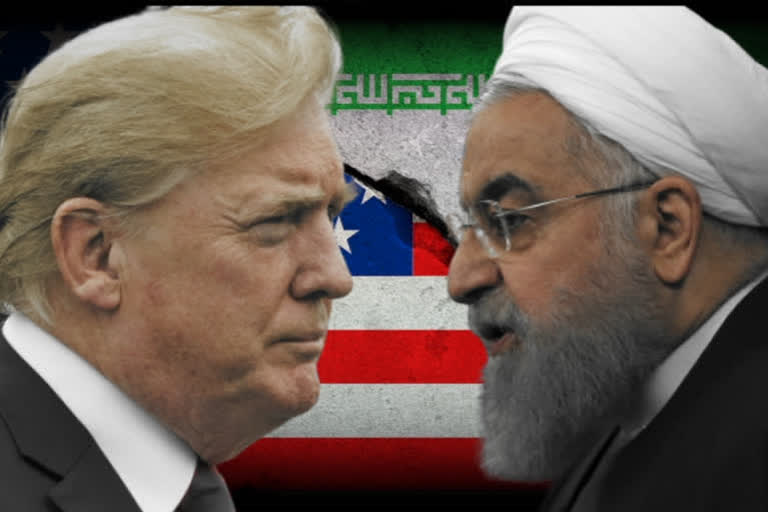New Delhi: The world heaved a sigh of collective relief as a major crisis that had the potential of triggering an armed conflict, serious disruption in petroleum supplies and a global economic slowdown was averted, in less than a week, due to some deft diplomatic footwork by Tehran and a matching response by the US President Donald Trump.
Within minutes of President Trump's conciliatory address in the evening of January 8th (IST) in which he called upon the Iranian people and leadership to engage in a peaceful dialogue, the oil prices began to drop and the stock market surged.
However, this could merely be a temporary respite. By firing over a dozen ballistic missiles at two American bases in Iraq, Iran demonstrated its capability of retribution, yet not wanting to stir the pot for the time being, may have opted to exact it at a later date.
The hostility between the 'Great Satan' and the clerical regime of Tehran (dubbed as a part of the by President George Bush) flared up once again on 3rd January, when a US drone strike assassinated Major General Qasem Soleimani, head of the Quds Force, an elite unit of the Iranian Revolutionary Guard Corps (IRGC). It plunged the entire region into uncertainty, anxiety and a danger of conflict.
Led by the austere and stern Supreme Leader Ayatollah Ruhollah Khomeini the Islamic regime assumed power in February 1979 upon the abdication of the Shah of Iran. In November 1979, radical students laid siege to the US Embassy in Tehran keeping 52 diplomats and personnel in confinement for 444 days. Ever since Washington and Tehran have had a turbulent relationship.
The US did its best to undermine the Islamic regime. During the 1980-88 Iran-Iraq war, Washington liberally supported Saddam Husain with funds, training and weaponry (officially denied). The traditional friendship between the US and the Sunni Saudi Arabia, Iran's adversary and the latter's deep-seated hostility towards Israel, further complicated the US-Iran ties. It did not help that Iranian leaders like President Mahmoud Ahmadinejad described Israel as a "disgraceful blot" that should be "wiped off the face of the earth".
Furthermore, to ward off perceived external threats, Iran embarked upon a secret programme to develop a nuke. Pakistan provided it sensitive nuclear know-how and equipment for uranium enrichment. To thwart its nuclear ambitions, the US and the United Nations (UN) imposed a series of debilitating sanctions.
A breakthrough was finally achieved with the conclusion of Joint Comprehensive Plan of Action (JCPOA) in July 2015 (between Iran and five permanent members of UNSC plus Germany) under which Tehran agreed to eliminate its stock of medium-enriched uranium and severely restrict that of low-enriched uranium as also centrifuges, for a period of 15 years. The Agreement was hailed the world over.
However, candidate Donald Trump termed it as a sell-out and one of the worst deals concluded by any American administration. He pledged to scrap the deal if elected and actually pulled out of JCPOA in May 2018. In parallel rumours began to circulate about Israeli and American plans to strike on Iranian nuclear facilities. Trump re-imposed sanctions on the Islamic republic and demanded that all nations cease importing its oil, notwithstanding that the sanctions were not endorsed by the United Nations. Given the clout of the US, India and most other countries reluctantly relented.
New Delhi has civilizational ties with Iran as also high stakes in the stability of the middle-eastern region which supplies a bulk of its hydrocarbon needs and hosts 8 million Indian nationals who remit back $40 billion annually. Secondly, given our robust relationship with the US, we do not have much of an elbow room and prefer not to take sides. The Iranian Ambassador's invitation (since denied!) therefore to India for playing a mediatory role was a non-starter. The issue is best resolved between Tehran and Washington. Besides we have always been averse to third party mediation.
Reverting to the US sanctions, Tehran lashed out angrily, and with justification since it had honoured its part of the bargain. It encouraged proxies in Iraq, Syria and Lebanon for example, to target the US troops and assets. On December 27, an American military contractor was killed by rockets fired at the military base in Kirkuk by Iran-backed militia. It culminated in the assassination of General Soleimani.
Read also: Rockets hit Iraq base hosting US troops
Tehran swore to avenge the death of Soleimani. More than a dozen missiles were fired as noted above at American military bases in Iraq. President Trump, however, tweeted that all was well and that a detailed assessment was being made. Slowly news began filtering out that there were no casualties, which was incredulous. Soon it became evident that Iran had staged an elaborate charade for the benefit of domestic its audience while tipping off the American side through Iraq, Switzerland and other back channels. This was a deft diplomatic move to diffuse the situation given that the White House was determined to come down heavily on Iran. Resultantly a surface calm has ensued.
By no token does it mean however that Iran and the US would bury their hatchet. In West Asia forgiveness is not seen as a virtue but a sign of weakness. Retribution tantamounts to the restoration of honour and national pride.
Iran has basically decided on a tactical retreat to fight another day. Hence the crisis has been averted in the short term but looms large in the longer term.



